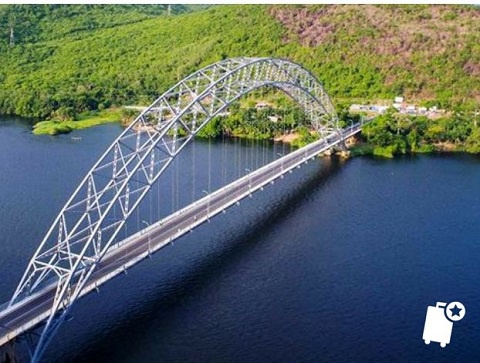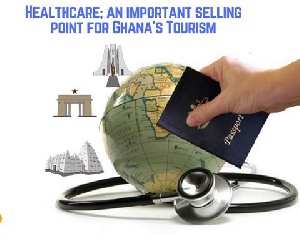Often as humans, we tend to believe health is important and of course it is. However, we usually don’t pay too much attention to it until we fall ill and have to go through some level of pain and discomfort.
In Africa and particularly Ghana, good health is almost like a cliche with various medical campaigns and adverts stressing the need for good healthcare and lifestyles. Internally, there is a cultural challenge when it comes to healthcare but a peep outside our country and continent indicates that the story is very different elsewhere. In Europe and the America’s, healthcare is a very delicate issue and is treated as such.
Due to the importance foreigners attach to healthcare, it is imperative that any country looking to develop its tourism and compete at the highest level with other giants in the tourism industry must also prioritize healthcare. Close attention is needed here if we are to grow our tourism and make it attractive. Jumia Travel, Africa’s leading online travel website looks at healthcare as an important selling point for Ghana’s tourism.
As a Ghanaian, you may know of the National Health Insurance Scheme which is a public health insurance system for residents that has replaced the old ‘’cash and carry’’ system. Although certain health facilities still operate with the old system, this new system is ideal for many Ghanaians which is good for all local workers in the tourism industry. However, the whole country is still some miles behind in terms of modern facilities,equipment and trained personnel. This is however the main reason why many Ghanaians still rely on self medication and herbal medicine especially in rural areas.
Types of healthcare facilities present in Ghana can be broadly categorized into 3.
The Private facilities. These are lucrative for doctors and other practitioners, they provide better quality of service and equipment. Laboratories are modern with state of the art machines, service is quick, there are better conditions and a generally better feel but these are also very EXPENSIVE. There are just a little above 1200 of them currently.
And then there are public/government owned facilities. These are estimated to be just under 2000 and slightly lacking in quality of service as well as personnel when compared with the private facilities. Public hospitals and clinics are usually congested, provide slower service, are affordable due to subsidies and NHIS and most often than not, lack adequate well trained personnel.
The third category is the religiously owned.These are the Muslim/ Christian facilities and are usually situated in rural areas built by missionaries or religious councils. Often not as well equipped as private and public although a few are very well managed and boast state of the art facilities and equipment. There are just a little over 200 of these currently.

Tourism is Ghana’s 4th highest foreign exchange earner after gold, cocoa and oil and to further boost this industry, it is very important that policy makers, regulatory bodies and stakeholders ensure a very strong well managed health system.
This can easily be one of our selling points as we aim to make Ghana the preferred tourist destination in Africa. The biggest challenge we face as a continent is the stigma that surrounds our name ‘’Africa’’. Europeans and Americans love to travel but they also love to be safe and healthy. They are more confident travelling, spending long periods and good money in countries where they are assured of good healthcare and security. What can we do to attract such tourists here as well as gain their trust and confidence? The answer lies right in front of us. Improve healthcare.
Foreign tourists have a far different tolerance and resistance to certain diseases in Ghana. The most disturbing ones are malaria, cholera, Hepatitis A & B. Some others that are usually prevented by vaccination include measles, chicken pox, meningitis and flu. When in Ghana, it is very important that they have access to good healthcare. Here are a few points to consider.
1. Proper management and digital technology. In the past, hospitals and pharmacies operated on a cash and carry basis. You may even go all the way to the hospital or pharmacy only to find out that the service you are looking for or the drug you want to buy is not available there.
Sometimes the facility may even be closed. Imagine this is an emergency and you are running out of time, TRAGEDY! A better management system as well as digital technology means that hospitals, clinics and pharmacies will run for more hours in a day and patients will have a reliable means of tracking the stock of drugs available or know the hospitals open to them at a particular time.
Online payment solutions also mean that tourists who operate foreign accounts can walk into any health facility and enjoy good health care not having to go through payment challenges.

2. Personnel and equipment. What makes healthcare systems successful in other parts of the world is basic. The personnel and the equipment. The challenge here is that, year in year out, the doctors, nurses and other practitioners who graduate either fly out for greener pastures or do not concentrate fully on the medical job because it is not rewarding enough. We find that many good hospitals are lacking adequate qualified health personnel.
On the other hand, modern equipment to effectively run these health facilities are either scarce or non-existent. You may have to roam about 4-5 ‘’Top hospitals’’ in Accra to find an MRI machine. To improve this, private as well as government owned hospitals must invest in providing good incentives for workers and health professionals while also acquiring state of the art equipment for smooth running of their hospitals and clinics.
3. The biggest challenge as Ghanaians is our inability to maintain the good facilities and equipment built to improve any sector of our economy.
A few years down the line and the previously brand new state of the art equipments may not be functional or may have broken down due to poor maintenance. When we succeed in bringing the equipment down, there is a dying need to ensure that they are maintained properly to last long. Regular cleaning and maintenance works and updates are required.
When we put such measures in place, there will be much more confidence in our healthcare system and tourists will feel relaxed coming into Ghana knowing that in case they fall ill, they can trust the Ghanaian system to take good care of them. The numbers will definitely increase and the industry will blossom.
Credit : Bennet Otoo, Jumia Travel
Opinions of Wednesday, 30 August 2017
Columnist: Bennet Otoo, Jumia Travel



















